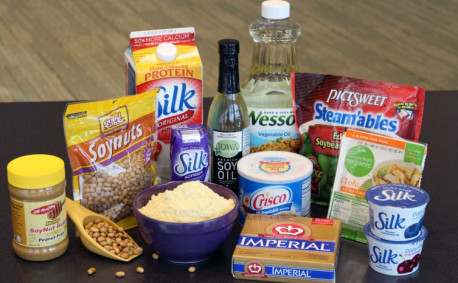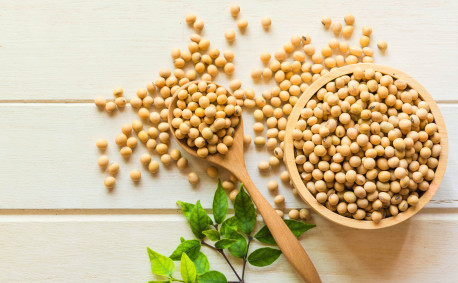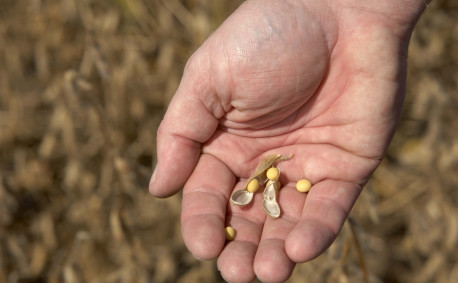Is Soy Safe for Men? Get the Facts
Researchers have been studying the effects of soy on the health of both men and women for decades. The data clearly shows soy, as part of a healthy diet, isn’t harmful to men. So why the lingering doubts?
 A few early studies in 1998 and 2001, along with a steady stream of evidence showing soy can counteract the effects of falling estrogen levels in menopausal women, led many to believe the protein-packed plant could have a feminizing effect on the male body. After all, anything used in the treatment of hot flashes shouldn’t be part of a man’s diet, right? That’s not the most irrational of conclusions, considering isoflavones — a plant-based estrogen found in soyfoods — behave a lot like human estrogen. When researchers took a deep dive into the growing collection of data, however, several key differences surfaced.
A few early studies in 1998 and 2001, along with a steady stream of evidence showing soy can counteract the effects of falling estrogen levels in menopausal women, led many to believe the protein-packed plant could have a feminizing effect on the male body. After all, anything used in the treatment of hot flashes shouldn’t be part of a man’s diet, right? That’s not the most irrational of conclusions, considering isoflavones — a plant-based estrogen found in soyfoods — behave a lot like human estrogen. When researchers took a deep dive into the growing collection of data, however, several key differences surfaced.
It’s not easy to find general, broad statements on the topic due to inconsistencies among the studies themselves — differences in the type of study (animal versus human), the form of soy used (tofu versus supplements) and the participants’ pre-study hormonal levels (high versus low). Still, the following facts from the Soy Nutrition Institute are backed up by some seriously sturdy studies that will ease your worries.
Claim: Soy lowers testosterone levels.
Fact or Fiction: Fiction
It all began when the initial studies in 1998 and 2001 raised concerns about soy’s ability to lower testosterone levels. Then came a 2008 report claiming soy caused a 60-year-old man to develop what scientists call “gynecomastia” (the rest of us call it, well, “man boobs”).
The alarming report was short on evidence, but made a splash when it was shared widely in the media. Just one year later, more tests showed neither soyfoods nor isoflavone supplements affect levels of bioavailable testosterone concentrations in men. In 2021, an update not only corroborated that finding, but revealed the two have no effect on male estrogen levels either.
As for the man boo — er, gynecomastia — the man had consumed nine times more isoflavones than a typical diet contains, and two follow-up studies failed to produce the same results.
Still, rumors of soy’s emasculating effects continued to circulate, especially on social media. Several authors of the 2010 analysis published another update that included data from over 40 clinical studies. Once again, neither soy nor isoflavones were shown to affect hormone levels.
Claim: Soy increases cancer risks.
Fact or Fiction: Fiction
Insulin-like growth factor-1 is a natural hormone that plays a crucial role in human growth and development. Unfortunately, it’s also suspected to encourage the growth of cancer. In 2018, scientists reviewed several older studies claiming soy protein increased IGF-1 levels and cancer risk. They were able to find evidence showing large amounts of soy protein (more than 25 grams per day) modestly increased IGF-1 levels above those observed with non-soy protein.
However, 25 grams per day is about what you’d get from three full cups of soymilk — a little more than most diets contain — so a study observing the effects of 19 grams per day was conducted in 2021. Researchers spent 18 months comparing soy’s effect on IGF-1 levels with the effect of casein, a protein found in milk. At the end of the trial, IGF-1 levels in the soy group were 2.8% higher while the casein group levels increased by 22%. Neither change was considered statistically significant, and 19 grams is still more than the men in the trial would be expected to eat daily.
Combining new results with existing data shows dietary levels of soy protein, regardless of the form in which it’s consumed, do not raise IGF-1 levels in men.
Claim: Soy protein has the same muscle-building effects as animal protein.
Fact or Fiction: Fact
Nutrition scientists increasingly note the importance of maintaining muscle mass and strength throughout life, which can’t be done without enough protein. In fact, if you’re trying to add muscle tone, experts recommend consuming about twice as much protein as an inactive person (about 0.7 grams per pound). Some have claimed only animal proteins support muscle development, but science shows those claims are weak.
Sure, you can beef up with beef. Meat will always be a fabulous source of protein and other nutrients, but some plant-based proteins support muscle development, too. Soy happens to be a “complete protein” providing all nine of the essential amino acids our bodies need for athletic performance, healing and mood regulation.
In 2018, researchers found soy protein supplements were capable of producing the same gains in muscle mass and strength as supplements containing animal protein (including whey protein, which is often considered to be the gold standard protein for building muscle).
Yes, Boys Can Enjoy Soy!
Soy has had to work hard to clear its name, but it finally has its place in the sun. The U.S. departments of Agriculture and Health and Human Services agree adding tofu, tempeh and soy protein powders to the protein category of their 2020-2025 Dietary Guidelines for Americans. Fortified soymilk and soy yogurt were included as well, as the only plant-based dairy alternatives considered to be comparable substitutes for milk and yogurt.
How much protein can you get from soy?
- Tofu (6-13 grams protein/3 ounces)
- Tempeh (11-17 grams protein/3 ounces)
- Edamame (9-11 grams/0.5 cup)
- Soymilk (7-8 grams/1 cup)
- Soy nutrition bar (6-14 grams/1 bar)
- Soy-based burger (9-16 g/1 patty)
The abundance of research and soy’s inclusion in the USDA Dietary Guidelines confirm soy is a healthy, nutritious choice for men (and women) of all ages.
Now that you know the whole story, why not add a few protein-packed soy meals to your diet? The Soy Nutrition Institute has a big collection of tantalizing tofu, mouth-watering miso and other delicious-looking recipes to try.




